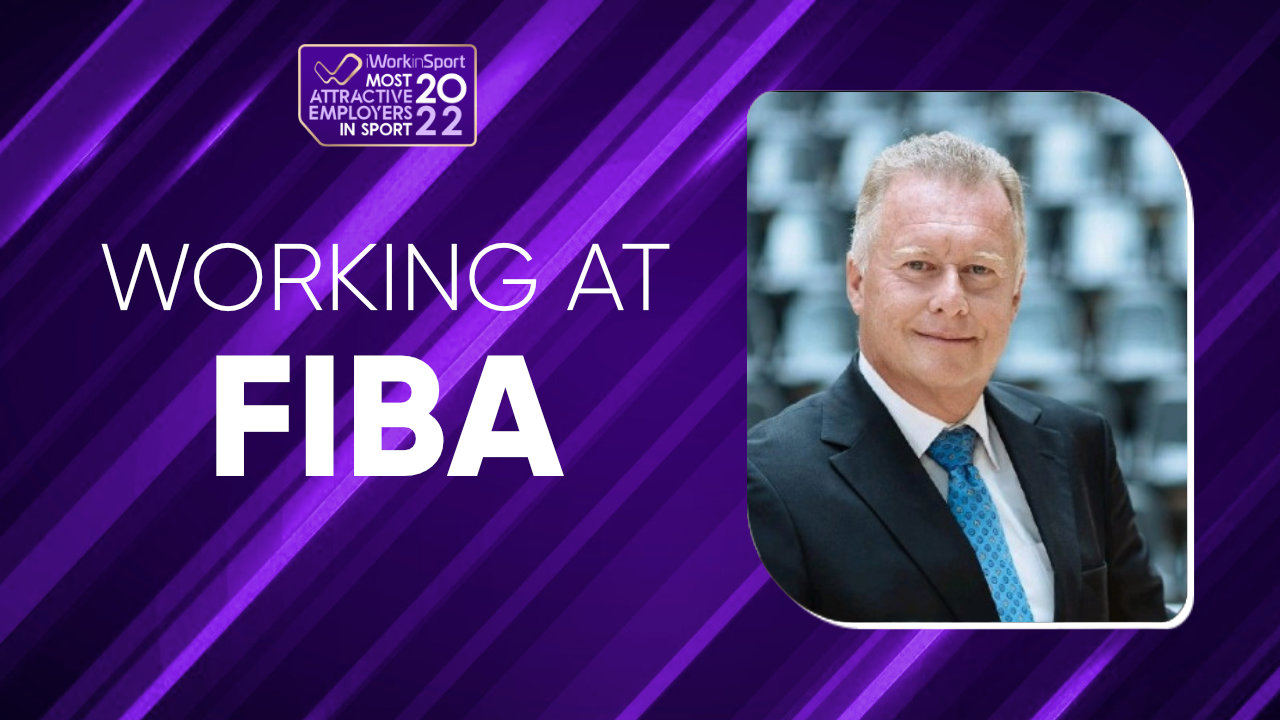Didier Rossi is the Global Head of Human Resources at FIBA. The International Basketball Federation was named earlier this year one of the Most Attractive Employers in Sport by a report published by iWorkinSport. This is one of five interviews with top recruiters in the industry featured in the publication.
The study surveyed more than 1,600 people from all continents, with the majority already working in sport, and asked them a simple question: “If you could choose to work anywhere in sport, where would that be?”
Initially, the respondents chose organisations divided into nine categories, and at the end, they indicated one single preferred choice, overall – the “Employer of their Dreams”.
The publication features rankings of the most attractive employers in sport divided in the following categories: Football Clubs, Sports Teams (other than Football), Sports Teams in the USA, Sports Leagues, Sports Governing Bodies, Event Organisers, Sports Marketing Agencies, Sponsors, Sporting Goods Companies and Sports Tech.
Additionally, the report presents the aspects that candidates rate as most important when deciding where they would like to work.
Congratulations, FIBA was named one of the most attractive employers in sport for the second year in a row. Why do you think that is?
We have a strong employee-centred culture and always try to treat our people well. I’m convinced word-of-mouth in the industry is helping us recruit the best employees, as reputation is key to attract candidates. We also see that the recruiting market has switched again more in favour of candidates, so offering a great work environment is a strong differentiator and is maybe giving us an edge over competitors. When you join us, whatever position you will fill, you will very quickly be thrilled by the positive atmosphere and fantastic work place.
What are the main common traits/skills that you look for in candidates applying to work at FIBA?
General traits we are looking for include:
- Good communication skills with fluency in several languages (English and French are official FIBA languages and any other languages are always a plus since we work with 213 national Federations)
- Being an autonomous, rigorous, agile continuous learner and organized hard-worker who can take initiative is vital in the VUCA (Volatility, Uncertainty, Complexity and Ambiguity) world we live in
- Good interpersonal skills, collaborative, and team player with a no-silo mentality, combining good IQ with good EQ is in our DNA and passion for the sport, especially Basketball ensures you’ll enjoy every single day here.
What makes an application stand out and (almost) guarantee an interview?
This depends on the position being recruited. For junior positions, we would expect a good education background (ideally Master level to ensure potential growth within the organisation – we promote about 10% of the staff each year) with some demonstrated interest in sport (in extra-curriculum activities for instance). While for more senior positions, we would focus much more on the gained experience in previous jobs. Previous experience in another federation or club with knowledge of Basketball is obviously positively appreciated or even required for sport-related positions in departments such as Sport and Competition, National Federations, Communications. While for general functions such as Finance, HR, Admin for instance, we would focus more on the subject-matter knowledge and experience.
What are some DOs and DON’Ts for candidates when having a job interview with you?
I always find mind-boggling, candidates who come to an interview without knowing the basic information about FIBA. I believe a pre-requisite when you apply is to show interest in your future employer.
Also, I’m quite amazed to see so few candidates being able to present their accomplishments in a comprehensive yet complete manner. When prompted to describe their past experiences, very few use the CAR (Context, Action and Result) structure for instance.
Great candidates will know how to sell themselves, but always staying true to who they are and not play a role. The recruiting process should be very honest in discussing the role expectations and confirming the candidate has the right skills and attitude to perform well in that position and will really enjoy the challenges she/he will face. And the employer must honestly present the work environment and what can be expected. Overselling on both sides is bound to create later frustrations. Interview is the time when both parties should confirm that there is a good match between requirements and expectations. This is the secret of a successful recruitment.
Now that the covid-19 crisis seems to be getting under control, what are the main challenges for an organisation’s HR department?
All our employees have been able to continue to carry their work remotely as of day 1 of the pandemic and we were among the first ones to restart competitions on a worldwide basis. Engagement survey results have shown that our Employees have appreciated the way we have handled this period. But we should not rest on our laurels, and we have implemented additional work-related measures to match the new expectations in this “new world”. Some new challenges include finding the right balance between leveraging the benefits of working from home with keeping a good team spirit within the departments. Also, we must be careful that the pandemic might not be totally over – Asia is still very impacted. So we must keep an eye on the evolution and be ready to take actions.


